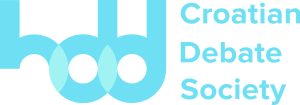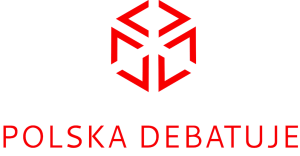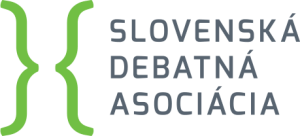Partners
Croatian debate society

Croatian Debate Society acts under the motto „Dare to think“. Our mission is to encourage democratic values and personal growth through education, open discussion, informal education, public advocacy and youth work
We implement our mission through four key programs: debate program, youth participation and civic education, socio-pedagogical program and international cooperation. Over the years we have organized numerous local, regional and international tournaments, several debate summer schools, and hundreds of public debates. Our debaters also competed in international tournaments and WSDCs, either as members of Croatia’s national debate team or CDS debate clubs. International tournament Winter Holidays Open, which takes place in Zagreb every year since 2013 (except the last two online editions), hosts around 100 teams and is the biggest in-person tournament in Europe. In 2018 CDS convened the World Schools Debating Championship, which was the biggest WSDC to date.
International Debate Education Association
 IDEA started in 1999 and has today become a huge network of youth organizations via our own association with members in 19 countries. Our goals and objectives include: fostering debate, discussion and dialogue among the citizens of states in Europe and throughout the rest of the world; enhancing awareness and the knowledge of the important issues affecting the lives of citizens and the communities in which they live; empowering members of communities and providing them with important skills such as public advocacy, critical thinking and research skills; promotion of the understanding and exercise of human rights. IDEA NL also teaches debate in order to, directly and indirectly, combat racism, xenophobia and social exclusion.
IDEA started in 1999 and has today become a huge network of youth organizations via our own association with members in 19 countries. Our goals and objectives include: fostering debate, discussion and dialogue among the citizens of states in Europe and throughout the rest of the world; enhancing awareness and the knowledge of the important issues affecting the lives of citizens and the communities in which they live; empowering members of communities and providing them with important skills such as public advocacy, critical thinking and research skills; promotion of the understanding and exercise of human rights. IDEA NL also teaches debate in order to, directly and indirectly, combat racism, xenophobia and social exclusion.
We run debate events for young people aged between 11 to 30, especially those who are marginalized – LGBT and ethnic communities, civic rights groups, supporters of gender diversity and democracy, and the socially and politically excluded. IDEA established the program Debate in the Neighborhood to educate young people with fewer opportunities to develop debating skills and to connect them to society. IDEA has vast experience in developing training materials for them and won a prize for best European Youth Project from Youth In Action in 2015. Today, we are as well an observer member of the European Youth Forum.
Za in proti, zavod za kulturo dialoga
 Za in proti, zavod za kulturo dialoga (Pro et Contra, Institute for culture in dialogue) – ZiP is a national debate organisation in Slovenia with more than 20 years of experience in developing, promoting, and implementing debate methodology and debate education, most notably in the field of debate as an extracurricular, cross-curricular and competitive activity.
Za in proti, zavod za kulturo dialoga (Pro et Contra, Institute for culture in dialogue) – ZiP is a national debate organisation in Slovenia with more than 20 years of experience in developing, promoting, and implementing debate methodology and debate education, most notably in the field of debate as an extracurricular, cross-curricular and competitive activity.
It is active on both national and international levels by coordinating their national debate program and organizing big international public events, educational camps, teachers’ seminars and experts meetings, such as the annual World Schools Debate Academy and International Debate Academy Slovenia, all while paying special attention to including youth from economically and culturally challenged environments in their network. As one of the leading international organizations in its field, ZiP advises and develops national debate programs around the world (Italy, Finland, Turkey, Morocco), and has also participated in significant EU projects (“Active Citizens Take Action”, “Discuss, Understand, Change”, “Thinking and Speaking a better world”…).
Polska Debatuje
 Polska Debatuje organizes nation-wide debate activities, including National Championships for students and high school pupils, since 2012. We work with student bodies, public and private institutions to organize our own projects, workshops, training, tournaments, summer camps and cooperate in spreading debate in Poland. We established long-lasting connections with active teachers and provide them with materials that we translate and accommodate to Polish schools.
In 2018, we created and distributed a free ‘Debating History Textbook’ that explains in plain Polish to teachers how they can involve their students in debating with a step-by-step approach.
Polska Debatuje organizes nation-wide debate activities, including National Championships for students and high school pupils, since 2012. We work with student bodies, public and private institutions to organize our own projects, workshops, training, tournaments, summer camps and cooperate in spreading debate in Poland. We established long-lasting connections with active teachers and provide them with materials that we translate and accommodate to Polish schools.
In 2018, we created and distributed a free ‘Debating History Textbook’ that explains in plain Polish to teachers how they can involve their students in debating with a step-by-step approach. Slovenská debatná asociácia
 Slovenská debatná asociácia is an independent NGO and the national debating body in Slovakia that was established in 1999 as a spin-off of the Open Society Foundation. Our mission is to promote critical thinking, open-mindedness and citizenship of young people.
We run programs that provide debate activities to middle school and university students and teachers, of which the high school program is the largest one. Other programs that we run are public discussions programs and a summer academy. Every year, SDA also organizes trainings for debate coaches, debate judges and volunteers. We bring expertise from creating such educational programs, as well as trainers with a wide background in non-profit and private sector settings.
Slovenská debatná asociácia is an independent NGO and the national debating body in Slovakia that was established in 1999 as a spin-off of the Open Society Foundation. Our mission is to promote critical thinking, open-mindedness and citizenship of young people.
We run programs that provide debate activities to middle school and university students and teachers, of which the high school program is the largest one. Other programs that we run are public discussions programs and a summer academy. Every year, SDA also organizes trainings for debate coaches, debate judges and volunteers. We bring expertise from creating such educational programs, as well as trainers with a wide background in non-profit and private sector settings. Institut za društvena istraživanje u Zagrebu
 The Institute for Social Research in Zagreb (ISRZ/IDIZ) is a public non-profit scientific research institution established by the University of Zagreb in 1964 with the aim of conducting fundamental and applied research in the field of sociology and related disciplines, such as psychology, social anthropology, political science, information science and philosophy. Our mission is to carry out socially significant, fundamental and applied quantitative and qualitative scientific research of different aspects of Croatian society, in a systematic, longitudinal and interdisciplinary manner. Our research topics include social structures, urban/rural sociology, youth, education, science, religion, sustainable development, gender differentiation and social inequalities.
Moreover, IDIZ has a long-standing experience in scientific research in the field of youth, sublimated primarily through the mission of its Centre for Youth and Gender Studies. The scientific research activity is focused on the topics of social, age and gender inequalities, construction of identity, sociocultural values, culture and leisure time, political culture and participation, age and gender-based distribution of social power, social inclusion and social capital, educational and professional aspirations, as well as unemployment and employment.
The Institute for Social Research in Zagreb (ISRZ/IDIZ) is a public non-profit scientific research institution established by the University of Zagreb in 1964 with the aim of conducting fundamental and applied research in the field of sociology and related disciplines, such as psychology, social anthropology, political science, information science and philosophy. Our mission is to carry out socially significant, fundamental and applied quantitative and qualitative scientific research of different aspects of Croatian society, in a systematic, longitudinal and interdisciplinary manner. Our research topics include social structures, urban/rural sociology, youth, education, science, religion, sustainable development, gender differentiation and social inequalities.
Moreover, IDIZ has a long-standing experience in scientific research in the field of youth, sublimated primarily through the mission of its Centre for Youth and Gender Studies. The scientific research activity is focused on the topics of social, age and gender inequalities, construction of identity, sociocultural values, culture and leisure time, political culture and participation, age and gender-based distribution of social power, social inclusion and social capital, educational and professional aspirations, as well as unemployment and employment.